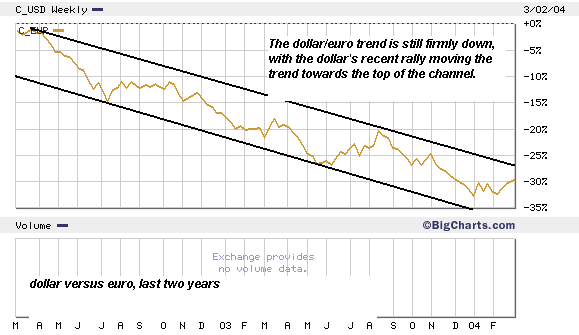Rampaging Dollar
The dollar is back, like the freak from a horror movie who just won't die, or so it would seem gauging the press reports from yesterday. Don't get me wrong, as an expat, I'm all for a strong dollar. It makes my rent cheaper. But there's a difference between what I want and what's "fair value" on the dollar. For the record, I give you a two-year dollar/euro chart below. The chart speaks for itself. But if you can't hear it, I'll merely say the firm two-year trend of weaker dollar versus the euro still holds. You could even see the dollar move back to under $1.20 to the euro and not violate what is fundamentally a negative trend. So why is the dollar kicking currency tail and taking names right now? Well, every central bank in the world has been pushing for a stronger dollar, whether actively (Japan) or verbally (the ECB.) Traders know better than being on the wrong side of a central bank, at least in the short term. THE DOLLAR/EURO TREND IS FIRMLY DOWNWARD
 You also have the remergence of the traditional hammer with which U.S.-centric investors beat Europe: growth. That is, the jobs and ISM data support the thesis (yet to be confirmed by the Fed's Beige book and the labor market report on Friday) that job growth in the U.S. is back. This would be the final piece of the "recovery" argument and undeniably dollar bullish if, and this is a big if, growth was all that mattered. On the other hand, the European economy slugs along, plagued with its own systemic problems, and without the vaunted "growth" story you hear in the U.S.
Is growth all that matters? Of course not. Job growth (and more importantly, income growth) is an absolute must in the U.S. economy. But it's a must because of the high levels of U.S. debt, consumer, Federal, current account, you name it. The dollar bullish argument now is that U.S. economic growth can somehow, some way, render this enormous debt irrelevant.
Fundamentally, there's not much substance to this argument. You can inflate debt away, making it less costly by paying back in dollars worth less. Or you can simply forgive it...a giant, politically motivated debt amnesty (possible in the housing market.) Growing out of it--at these levels...would require both an increase in incomes and a huge decrease in spending, which would have a whole other set of economic consquences.
When the market has spoken on the dollar, it's sold it. Right now, the market is being shouted down by monetary authorities. These authorities are desperately trying to extricate them from a trap of their own making. They're going to fail. But in the short term, if it makes my beer a little cheaper, I won't complain.
The ECB speaks tomorrow and should leave rates unchanged. The job market report on Friday may even drive the dollar to new strength. But there's $7 trillion in government debt and a badly damaged consumer balance sheet weighing against the dollar. And on that issue, the currency market has already spoken with a bearish voice.
Don't be surprised if by the end of the year, you again see dollar euro 1.30 or more, and dollar British pound of 2.0 or more. In fact, this bullish foray buy the dollar makes the next few weeks an even better time to get into dollar bear positions for gains, once the short-term dollar bull runs out of gas.
You also have the remergence of the traditional hammer with which U.S.-centric investors beat Europe: growth. That is, the jobs and ISM data support the thesis (yet to be confirmed by the Fed's Beige book and the labor market report on Friday) that job growth in the U.S. is back. This would be the final piece of the "recovery" argument and undeniably dollar bullish if, and this is a big if, growth was all that mattered. On the other hand, the European economy slugs along, plagued with its own systemic problems, and without the vaunted "growth" story you hear in the U.S.
Is growth all that matters? Of course not. Job growth (and more importantly, income growth) is an absolute must in the U.S. economy. But it's a must because of the high levels of U.S. debt, consumer, Federal, current account, you name it. The dollar bullish argument now is that U.S. economic growth can somehow, some way, render this enormous debt irrelevant.
Fundamentally, there's not much substance to this argument. You can inflate debt away, making it less costly by paying back in dollars worth less. Or you can simply forgive it...a giant, politically motivated debt amnesty (possible in the housing market.) Growing out of it--at these levels...would require both an increase in incomes and a huge decrease in spending, which would have a whole other set of economic consquences.
When the market has spoken on the dollar, it's sold it. Right now, the market is being shouted down by monetary authorities. These authorities are desperately trying to extricate them from a trap of their own making. They're going to fail. But in the short term, if it makes my beer a little cheaper, I won't complain.
The ECB speaks tomorrow and should leave rates unchanged. The job market report on Friday may even drive the dollar to new strength. But there's $7 trillion in government debt and a badly damaged consumer balance sheet weighing against the dollar. And on that issue, the currency market has already spoken with a bearish voice.
Don't be surprised if by the end of the year, you again see dollar euro 1.30 or more, and dollar British pound of 2.0 or more. In fact, this bullish foray buy the dollar makes the next few weeks an even better time to get into dollar bear positions for gains, once the short-term dollar bull runs out of gas.

0 Comments:
Post a Comment
<< Home